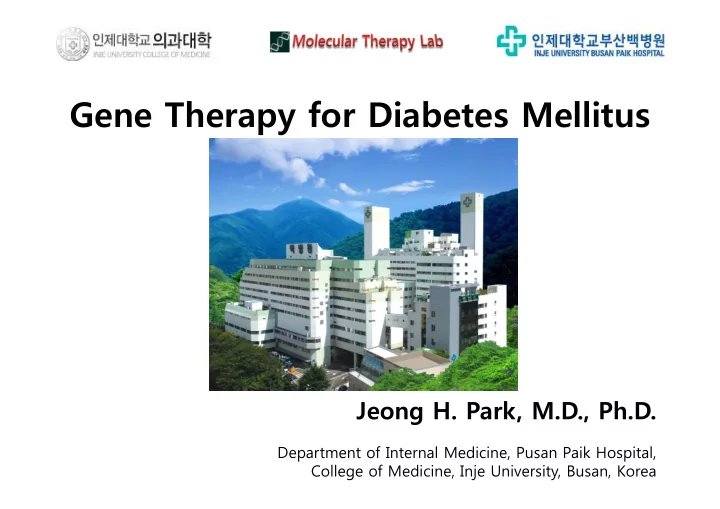

Gene Therapy for Diabetes Mellitus Jeong H. Park, M.D., Ph.D. Department of Internal Medicine, Pusan Paik Hospital, College of Medicine, Inje University, Busan, Korea
Disclaimer 1. I received only official lecture fee from Korean Diabetes Association for this talk 2. I do not own venture corporations, and hold any stocks of pharmaceutical companies 3. Because my concerns are concentrated in the non-viral gene delivery system, my talk might include biased opinions for the gene therapy researches using viral gene carriers
Contents 1. Definition & Current Status of Gene Therapy Researches 2. Gene Therapy for Type 2 Diabetes Mellitus 3. Gene Delivery Systems & Potential for the Commercial Novel Therapies 4. UTMD (Ultrasound Micro-bubble Destruction) Gene Therapy 5. Our Previous & Current Works 6. Future Perspectives
Gene Therapy Gene Delivery Techniques Therapeutic Therapeutic Nucleic Acids Nucleic Acids
Kim et al. Mol Therapy 2007;16:237-243
Comparisons with Conventional Therapy ������������� ������������ ������� ��������� ������������������������������ �������������������������� ��������� �������������������������� �������� ���������!���������"����������������� %&&��������'������� ������#�������������$������������ ���"����������&&��������� #�����$� ����� ���'������ �������������'����������&��'���������� ����������������'�� ����������������� ����������&� ����"�������������������������"�� �������������'���&&���� %&&��� ���������(�������)���������������� ������������*������� ���������������'������ ������ ������������ �����������
��������������� ������� � �������� ��������� ��������� ����������� ����������� ��������
Gene Therapy for type 2 Diabetes ? - Polygenic disorder : Gene – Environmental Interaction - What is the canditate gene ? - Causes ? or just Risk Factors ? - Insulin deficiency : Insulin GT, Beta cell rejuvenation, regeneration - Insulin resistance : Hepatic glucose production, adipocytokines - CNS, neural regulation : leptin signaling Diabetic Symptom Palliation rather than CURE
Gene Therapy for type 2 Diabetes ? G T Lancet 2009;6736(09):60448-7
Gene Therapy Gene Delivery Gene Delivery Techniques Techniques Therapeutic Therapeutic Nucleic Acids Nucleic Acids
Gene Delivery Methods ������������� ��� !������������ � ������������������ � ����������� � ���������� ������� � �������� � ������������������ � �������� � ��� � ������������ � ��� � ������������ � ����������� � ��������������� � �������� ����� � ��������
Transduction Integration efficiency efficiency Chemical Calcium-phosphate transfection Low Low DEAE-dextran transfection Low Low Physical Electroporation Low Low Microinjection High Low Particle bombardment High Low Fusion Liposomes Low Low Receptor-mediated endocytosis DNA-protein complexes High Low Viral envelope/capsid-DNA complexes High Low Recombinant viruses Adenovirus High Low Adeno-associated virus (AAV) High High Herpes simplex virus Low Low Human immunodeficiency virus (HIV) High High Moloney murine leukemia virus High High Vaccinia virus High Low
Barriers for Gene Therapy
Tragedies in Early Clinical Trials
Requirements for the Success in Real World ����� ����� ���������������������� �������������������� ������������������������ ! ������ ����������������� �������������������� �� ��� ������������� ���������������� ������������������ ���������������� ��������������������
Requirements for the Success in Real World SU Gene metformin Therapy DPP-IV TZD ��������� insulin incretin SGL2 superiority investment practicalize
Safest method in Gene Therapy ?
UTMD: Sonoporation
����������� ������������ ���������������������������������
Efficiency vs Toxicity.. Sonoporation
Journal of Drug Targeting 2008;16(10):773-779
Journal of Drug Targeting 2008;16(10):773-779
Expert Opin Drug Deliv 2010;7(3):321-330
UTMD: Sonoporation . One of the main advantages of drug or gene delivery by sonoporation is to achieve site specificity with negligible local and systemic toxicities, by the optimization of parameters of ultrasound and microbubbles. . The dynamic characteristics of ultrasound that induce cell membrane porosity can be controlled by ultrasonic factors such as frequency, intensity and duration. . The induction of microbubble cavitation by ultrasound has been considered a major mechanism of delivery, which carries non-permeable macromolecules across the cell membrane. . Ultrasound can act synergistically with other vector systems in order to have several advantages, such as low cytotoxicity, high target selectivity, low immunogenicity and repeatable application. Expert Opin Drug Deliv 2010;7(3):321-330
UTMD: Sonoporation . Gene delivery by sonoporation could be a possible therapeutic alternative in current cancer treatment. . Non-invasive specific gene transfection into the deep seated internal organ is very difficult. Sonoporation might be used for this purpose and the possibility for the application of this technique to the various kinds of diseases would be promising. . Particularly suited for the various localized diseases and the diseases requiring limited transfection into the deep-seated organs or tissues, sonoporation could be used successfully in clinical practice in the near future. . Along with its superior safety profile, sonoporation might be regarded as a pioneering technique that could move gene therapy a step closer to clinical medicine. Expert Opin Drug Deliv 2010;7(3):321-330
Improving Gene Expression - Minicircle M Calos et al. JMB, 2004 J Cont Release 2006;114:118-125
J Kor Diabetes Assoc 2007;31:465-471
J Kor Diabetes Assoc 2007;31:465-471
Improving Gene Expression - Modification Kor Diabetes J 2008;32:131-140
Kor Diabetes J 2008;32:131-140
Kor Diabetes J 2008;32:131-140
Pharm Res 2009;26(4):794-801
Pharm Res 2009;26(4):794-801
Pharm Res 2009;26(4):794-801
Pharm Res 2009;26(4):794-801
Pharm Res 2009;26(4):794-801
J Gene Med 2012; 14 :272-278
J Gene Med 2012; 14 :272-278
J Gene Med 2012; 14 :272-278
β-Cell Function Continues to Decline The Last Topic – Type 2 Diabetes Remission Regardless of Intervention in T2DM Progressive loss of β-cell function Sulfonylurea (n=511) occurs prior to diagnosis 100 Diet (n=110) Metformin (n=159) 80 β-Cell Function (%)* 60 40 20 0 –5 –4 –3 –2 –1 0 1 2 3 4 5 6 Years Since Diagnosis UKPDS Group. Diabetes . 1995; 44: 1249–1258.
β-Cell Function Continues to Decline UTMD-Pancreatic β cell targeting Regardless of Intervention in T2DM PA Grayburn et al. Gene Therapy 2010
PA Grayburn et al. Gene Therapy 2010
PA Grayburn et al. Gene Therapy 2010
Recommend
More recommend